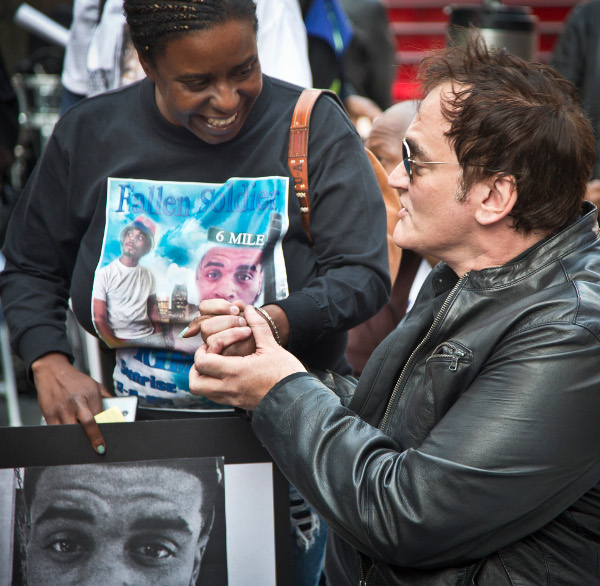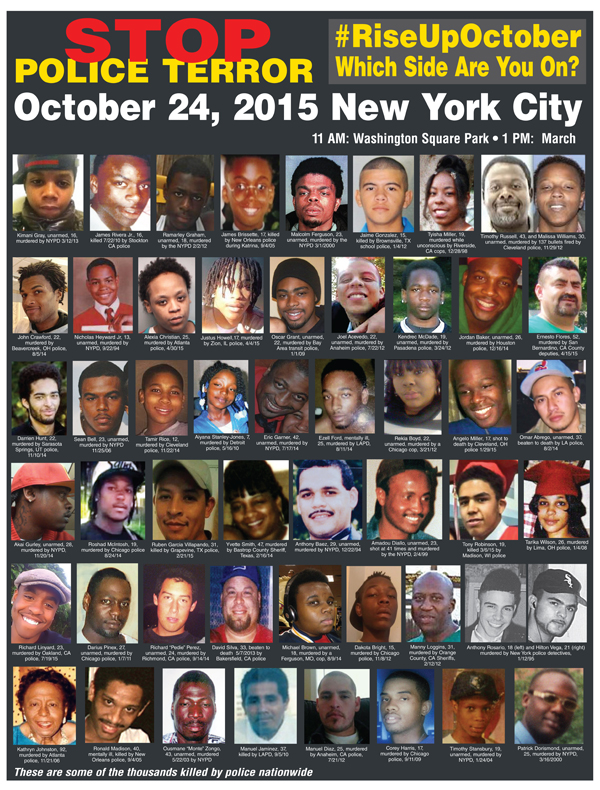Quentin Tarantino Interviewed by Michael Slate
October 26, 2015 | Revolution Newspaper | revcom.us
Quentin Tarantino was interviewed by Michael Slate while marching in October 24 Rise Up October: STOP POLICE TERROR.
When Black and Latino lives are being stolen by the police in epidemic numbers—we need more and more people saying this:
Listen to audio of this interview HERE.
Listen to Michael Slate interview Jamal Joseph, Eve Ensler, Kwame Anthony Appiah and Arturo O'Farrill HERE.
Michael Slate: I’m from KPFK in LA.
Quentin Tarantino: Hey!
Michael Slate: Can I talk to you? Ask you just a few questions as we are walking? All right. You came out on Thursday. And it was very moving... I was there just listening to those stories. Then you come out today and it’s pretty important that you are out here, that your voice is out here. What made you feel compelled to be here?
 Quentin Tarantino meets Kimberly Griffin, whose son Kimoni Davis was killed by police. No More Stolen Lives: Say Their Names, A Public Reading and Remembrance--A Demand for Justice, Times Square, October 22. AP photo
Quentin Tarantino meets Kimberly Griffin, whose son Kimoni Davis was killed by police. No More Stolen Lives: Say Their Names, A Public Reading and Remembrance--A Demand for Justice, Times Square, October 22. AP photo
Quentin Tarantino: Well, what made me feel compelled basically is I’m a human being and I have a conscience. I’ve been sitting here and I’ve been watching. It’s been going on for a long time, but for the last year and a half it seems like you just see one Black and Brown man or woman killed... murdered by the police. Unarmed. And I believe that there is a problem in the police culture itself that is corrupt and the culture needs to be changed. And the thing about it is if I actually do feel that it is murder and it’s not extenuating circumstances, then I have an obligation to stand with the murdered against the murderers and that’s what I’m doin’ here.
Michael Slate: A lot of people have made the reference to genocide, a slow genocide yes... but a genocide that’s in formation and actually taking place as we go along. What do you think of that?
Quentin Tarantino: I think that makes a lot of sense. I mean, you know, to me the whole mass incarceration situation that’s been going on for the last 20 years, I think 30, 40 years from now people will call it “slavery, part 2.” American slavery, part 2. And that issue and this issue are married to each other, they are linked in arms. My job isn’t to be the most eloquent person speaking on this subject that there is. There’s a whole lot more people here more eloquent than me. But I can put my body here.

Poster PDF (for print) color | black & white JPG (full size, for web)
Michael Slate: And also it does make a difference that your voice is heard. There’s people in society that have disproportionate influence based on the work that they do, a lot of times, in your case in particular. So it makes it... no matter what it is it’s actually important when someone like you comes out and stands up and says, “Look, I see what’s going on. I can’t sit there and pretend I don’t.”
Quentin Tarantino: That’s the thing. One of the things about the movement that actually just means so much is that they have a powerful slogan: “Which side are you on?” If you’re not on our side, you’re on their side. There’s no straddling the fence. There’s no silent majority. There is none of that. You have to take a stand. If you believe it’s murder, then you gotta call it murder. And you gotta call the murderers, murderers.
Michael Slate: Absolutely. One more and then we’ll be through. Well, two more. One is this Niemoller quotes have been coming up in my mind a lot in relation to this. First they came for these people, but I didn’t say anything1. And it goes down the line. Then there’s a second one2 he talked about that a lot of people don’t talk about where he speaks to this last point that you made—What if... When he got out of the concentration camp, he said I have to think, what if we had stood up, what if we had spoken out, what if we had done something, think of how many lives might not have been taken
Quentin Tarantino: Oh, absolutely. Absolutely. It’s funny, a lot of people here involved in this movement, some of them are of very different minds about what should be done, and some of them are for all out revolution. I like the idea of that, but I don’t think that’s the only answer. I actually do think that massive resistance, which is what this is, can stop this, can put a pause in it, can put a second thought in it with these cops. And I do believe that there is a corrupt culture inside of the police force, that needs to be straightened out. They are just too authoritative. Nobody should be stopped and actually have no rights during that encounter until later. That’s just untenable.
Michael Slate: What would you say to people who hear your voice now, what would you say to them about what they need to be doing?
Quentin Tarantino: If you don’t believe the way we believe, well then you don’t and that’s where you stand. But if you believe where we’re comin’ from, and you believe that it is murder, and you believe people are being killed, then you have to say something. You have to join. You have to stand up. You have to join with us, and there’s a lot of different ways you can do that, but you need to. Because that’s the only way it’s going to stop.
Michael Slate: How actually do you see it being made to stop?
Quentin Tarantino: I actually do think that if this happens enough, and it actually becomes like a ’60s movement thing in a real way, which actually would be very interesting because the Civil Rights Movement was led by young people in the ’60s. This is being led by moms, this is being led by fathers, this is being led by family members and young people are catching up and that’s a really terrific thing. And so I think that it literally can be a situation, if it comes out there, then we can change the police force, we change the way the police academy teaches the police, and we can get rid of some of these cops. You should have a higher calling to be a cop. We expect our doctors to aspire to a higher calling, not just have a job. We expect the people who work... the paramedics and the ambulances, we expect them to aspire to a higher calling, not just have a job. And we need to expect that from the police. They’re not just having a job and things happen.
Michael Slate: Quentin Tarantino, thank you very much.
1. Poem by Martin Niemoller, a German pastor who opposed the Nazis:
First they came for the Communists, and I didn't speak up because I wasn’t a Communist.
Then they came for the Jews, and I didn't speak up because I wasn't a Jew.
Then they came for the trade unionists, and I didn’t speak up because I wasn't a trade unionist.
Then they came for the Catholics, and I didn’t speak up because I was a Protestant.
Then they came for me, and by that time no one was left to speak up. [back]
2. “We preferred to keep silent. We are certainly not without guilt or fault and I ask myself again and again, what would have happened, if in the year 1933 or 1934, 14,000 Protestant pastors and all Protestant communities in Germany had defended the truth until their deaths? If we had said back then, ‘It is not right when Hermann Göring simply puts 100,000 communists in concentration camps in order to let them die.’ I can imagine that perhaps 30,000 to 40,000 Protestant Christians would have had their heads cut off, but I can also imagine we would have rescued 30 to 40 million people, because that is what it [cost us].” [back]
Volunteers Needed... for revcom.us and Revolution
If you like this article, subscribe, donate to and sustain Revolution newspaper.







